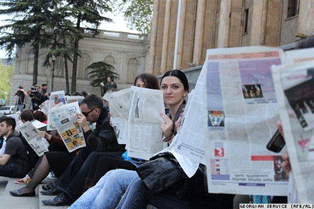Eka Kevanishvili, Radio “Liberty”
On the twentieth anniversary of the International Day of Press Freedom, May 3, famous international organization rated Georgian media as “partly free” again.
Georgian opposition parties and non-governmental organizations do not think Georgia has achieved much progress by improving its rating with 4 points. In order to better demonstrate how real the progress was, the Georgian Republic Party released a special statement on May 3. The Press Freedom Day was celebrated by several events in Tbilisi.
The member organizations of the Human Rights House Tbilisi celebrated the World Day of Press Freedom by demonstration in front of the parliament of Georgia; the participants were holding the newspapers up-right down.
“It makes no difference how we hold the newspaper because even if you read the newspaper correctly, the information in it is not always correct. The reason is oppression on independent printed media and the spread information is not completely impartial,” said Nino Elbakidze from the Article 42 of the Constitution.
A day before, the international organization Freedom House released the 2011 Report on Media Freedom Worldwide. The report, which evaluates the media freedom in the world, states that Georgia proceeded at 4 points in comparison with last year; nevertheless it still is the country with partly free media with the 55 points (According to the Freedom House, Georgia, Malawi and Moldova rated equally).
Aleko Tskitishvili, Editor-in-chief of the online newspaper of the Human Rights Center www.humanrights.ge and former journalist of the Georgian newspaper Resonance, also participated in the demonstration. He recalled the years when free media was establishing in Georgia. “Free printed media appeared in Georgia about 20 years ago and it always had to overcome some obstacles. Although I was threatened with death and police officers beat me during my journalistic activities, I should admit that free media really existed and still exists in Georgia. However, my colleagues and I wonder: which period was better – time ten years ago or current time?”
According to his findings, the intimidation methods on media are different today; however, it is fact that the oppression is more severe and freedom level is less. “It is fact that there has never been similar censorship in Georgian TV-Companies before. Today, nobody knows who owners of the TV-Companies are. Journalists only know that nine-headed dragoon owns TV-companies and Vano Merabishvili (interior minister) is one head of it… Printed media has fewer problems in this direction; however, they face problem of distribution and I think it the government creates this problem for them. They hinder distribution of newspapers in the regions.”
Tskitishvili said government has not acquired methods to oppress online media yet; though alongside the strengthening of the online media in Georgia, online censorship might also increase. “We, those who work in new media, feel ourselves a bit safer and I think we have huge potential to develop and assist the printed media as well as free TV-media in the country.”
UN Special Report also underscored the particular importance of the new media throughout the world. The UN made a new theme of May 3 this year: “Media of the 21st Century – New Frontiers, New Barriers”. The appeal reads: “Human rights violations shall be responded. Governmental officials should put an end to the impunity of offenders and protect safety of journalists.”
The government of Georgia thinks the progress in media freedom is evident and the main reason is the 2010 parliamentary initiative on media ownership transparency which ended up with the introduction of legislative amendments this year. Georgian MP Chiora Taktakishvili spoke about altered scheme of funding of the Georgian Public Broadcasting during her interview with the Radio Liberty. She said it will guarantee the independence of the GPB.
Opposition parties do not share the pathos of the government. On May 3, secretary of the Republic Party Levan Berdzenishvili initially clarified the meaning of “partly free” country. “In 2001, printed media was freer in Georgia than now according to the report of the same Freedom House – its status was “free” then. What does the “partly free” mean? It means, there are free and not-free journalists in Georgia now.”
Then, he suggested the TV-Company “Imedi” to measure the freedom of media in Georgia. “Today, we suggest the TV-Company to prepare a special reportage about the ECHR Judgment on Sandro Girgvliani’s murder because this TV-station was the first who informed Georgian population about the accident.”
African journalists adopted the Declaration on Press Freedom in Windhoek, capital of Namibia on May 3, 1991. The Declaration calls upon the state authorities to promote freedom of media. On December 21, 1993 the UN General Assembly proclaimed May 3 to be the International Day of Press Freedom.
The day reminds the world that freedom of expression is still blatantly breached in several states throughout the world; and sometimes journalists have to generously implement their professional duties at the expense of their freedom and even of their lives.
http://www.radiotavisupleba.ge/content/article/24089827.html




